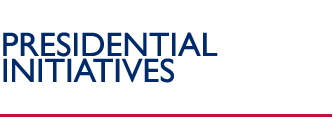Volunteers for Prosperity

In May 2003, President Bush announced Volunteers for Prosperity (VfP), an initiative that deploys skilled volunteers
in official U.S. foreign assistance programs that advance health and prosperity. Executive Order 13317 of September 25, 2003, required USAID and the departments of State, Commerce, and Health and Human Services to set up VfP offices or operating units. USAID serves as the interagency coordinator for the initiative, and USAID's VfP Office reports to USA Freedom Corps, the White House office that coordinates federally supported domestic and international volunteer programs, including AmeriCorps and Peace Corps. Six other presidential initiatives (discussed separately) participating in VfP are the Digital Freedom Initiative, Water for the Poor initiative, Trade for African Development and Enterprise (TRADE), President's Emergency Plan for AIDS Relief, Middle East Partnership Initiative, and Millennium Challenge Corporation.
- USAID's VfP Office recruited nearly 200 nonprofit and for-profit organizations representing a pool of at least 34,000 skilled U.S. professionals. VfP organizations report that nearly 7,000 volunteers have been deployed, and that nearly 4,000 volunteer opportunities are currently available.
- USAID's VfP Office contributed to the establishment, management, and direction of VfP offices and operating units in USAID and the departments of State, Commerce, and Health and Human Services. The VfP Office advised these agencies and departments on the modification of relevant U.S. Government grant procedures in the six presidential initiatives to support the effective use of highly skilled U.S. volunteers.
- VfP is supporting a new paradigm of private-public cooperation in foreign assistance. Organizations not previously involved in official foreign assistance-ranging from smaller faith-based and community groups to trade associations to corporations-have joined VfP to help highly skilled U.S. volunteers answer the President's call to service. VfP is building a network of organizations that support international voluntary service.

Volunteers Help Create Sustainable Jobs in Kenya
Partners for Christian Development (PCD), a private voluntary organization based in Grand Rapids, Michigan, became one of the first groups to win a federal grant under the VfP executive order. The $200,000 grant from USAID's Bureau for Africa will help PCD support the TRADE activities. The grant supports a program to create sustainable jobs for the poor in Kenya by encouraging the growth of micro-, small, and medium-sized businesses. PCD, through its Million
Mentor Alliance initiative, will mobilize business people and professionals to volunteer as mentors with small and medium-sized enterprises in Kenya, providing the customized, caring business support that encourages sustainable business growth and success.
- A website that is highly informative, intuitive, and easily navigable is critical to VfP's success because it attracts organizations that are willing to volunteer.
- Because the VfP Office does not have its own funds to directly implement activities, program success depends on the commitment of the six participating initiatives to utilize VfP's volunteer services.
- With administration of VfP and the six participating initiatives dispersed among government agencies, support must be significant and sustainable.
Note: Results for this initiative were reported through USAID's consolidated reporting system
Back to Top ^
|


